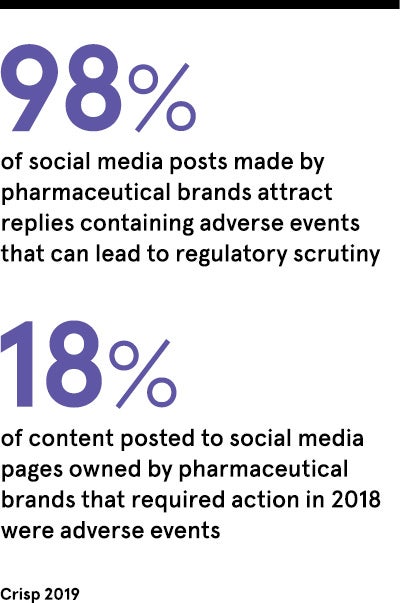Got a mystery lump? Coughing a bit? The first thing patients do with a symptom is go online for self-diagnosis. But how accurate is the information? Research by Health Feedback, a coalition of scientists, looked at the 100 most shared medical articles on social media. Only one in four was rated as highly scientific and one third were actively harmful. In 2016, more than half of the most shared cancer-related articles on Facebook were scientifically invalid.
On the internet, fake news travels faster than truth. Research published by the American Journal of Public Health found rumours gain three times more shares than verified stories.
The anti-vaccination movement is a strong example. Disinformation is rife and rising. For example, the World Health Organization (WHO) lists “vaccine hesitancy” as a top ten risk, fuelled by poor quality information online. In France, one in three people disagree that vaccines are safe. In the past year, the number of measles cases has risen 462 per cent, illustrating the scale of the risk.
According to Heidi Larson, former head of UNICEF’s global immunisation communication programme and now director at the London School of Hygiene & Tropical Medicine: “The questioning of vaccines is not new, but in the context of social media it is amplified quite a bit.” The internet, she says, is pushing fake medical news to a “tipping point.”
The threat from the internet also exists in counterfeit drugs. WHO estimates half of drugs sold online are falsified in some way. Among those counterfeits most commonly sold are steroids and hormones. The spread of counterfeit drugs poses a reputational risk for authentic brands. A survey of UK doctors’ surgeries found 25 per cent had treated a patient who had experienced an adverse effect from a drug bought online.
Despite this, pharmaceutical companies are cautious about entering the online arena. Adverse event reporting rules mean brands are obligated to disclose all unexpected side effects arising from their products, when made on the brand’s own social media channels. 
It’s a big burden. Research by Crisp, which works with pharmaceutical brands to keep their social presence safe and compliant, shows 98 per cent of social media posts by pharmaceutical brands attract replies mentioning adverse events. Eighteen per cent of content posted to social media pages owned by pharmaceutical brands were adverse events.
“Pharma brands need to engage in patient-centric conversations online wherever that discussion is happening,” says Emma Monks, vice president of crisis intelligence at Crisp. “But they feel they can’t due to the burden of adverse event reporting and the lack of resources and in-house expertise to do it. The need to report even those issues in non-English adds to the load and that is why a partner who specialises in pharma compliance is critical.”
If brands don’t engage, they risk failing to protect the integrity of their brand. Companies promoting unproven health alternatives, or counterfeit drugs, will fill the vacuum and erode trust in the licensed brands. There is a solution. Pharmaceutical brands can work with a partner, such as Crisp, to ensure regulatory obligations are met and help challenge disinformation online. The pharmaceutical brand can be the first to know of any challenges arising on the internet, enabling them to plan a response.
Global pharmaceutical companies turn to Crisp to keep their social presence safe and compliant, giving their marketing teams complete confidence to focus on patient engagement and the freedom to gather patient insights. Crisp offers social media compliance and social listening compliance solutions to ensure pharmaceutical brands deliver world-class social engagement with patients and consumers.
“My advice is to frame the obligation as a positive,” says Ms Monks. “Pharmaceutical companies that engage in social media can promote truth, enhance their reputations and leverage a key differentiator over slower competitors. A social media safety partner can help companies master all the challenges of cyberspace. There is a fantastic opportunity to engage with consumers and become a trusted source of information.”
For more information please visit crispthinking.com




